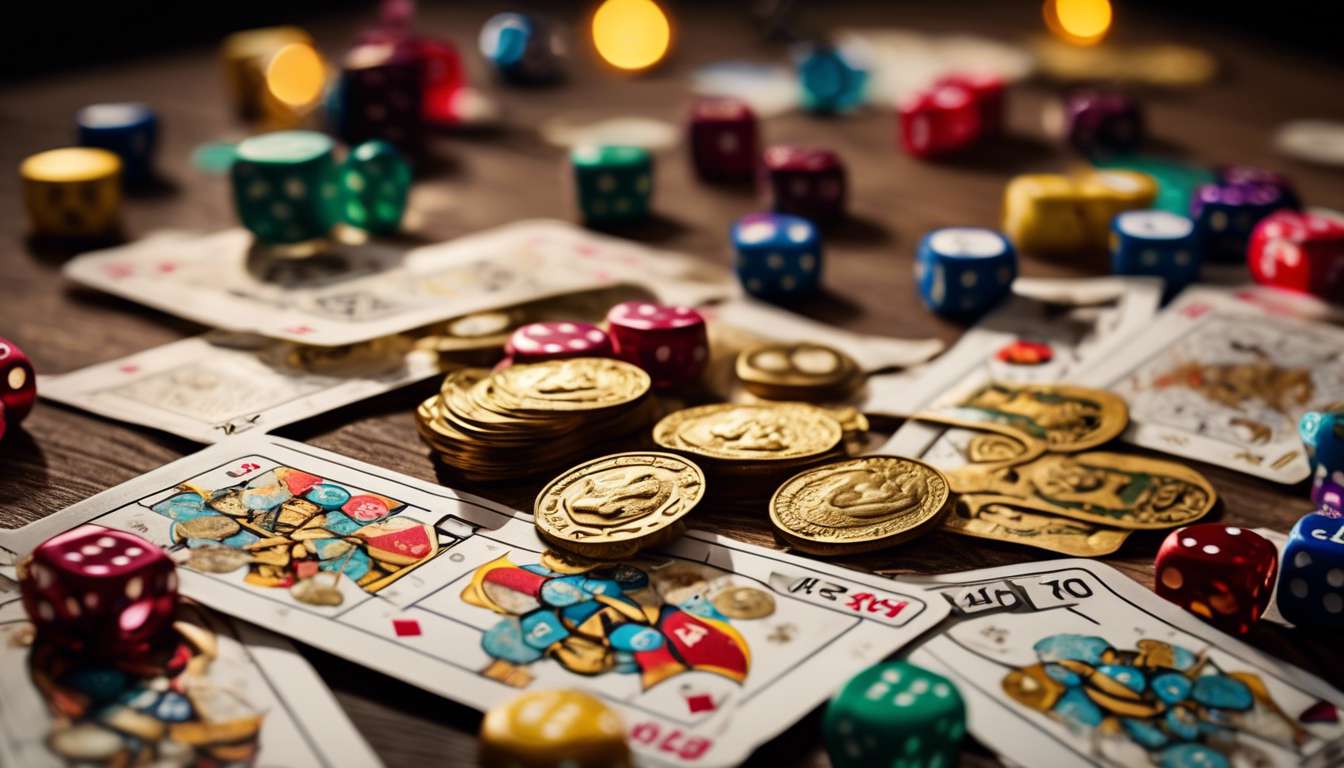As we gather around the idea of lottery gambling, we find ourselves drawn to the allure of instant wealth and the tantalizing prospect of a better future. It’s a topic that sparks curiosity and debate among us, prompting questions about luck, strategy, and the impact on our lives.
In this article, we delve into the insights of nine experts who offer diverse perspectives on the world of lottery gambling. They shed light on the psychological, economic, and social implications of this popular pastime, providing us with a deeper understanding of its complexities.
From the thrill of purchasing a ticket to the statistical probabilities that govern our chances, we explore the multifaceted nature of lottery gambling. By examining these expert opinions, we aim to equip ourselves with knowledge that not only informs our decisions but also enriches our discussions about the role of chance and choice in our lives.
Understanding the Psychology Behind Gambling
Gambling taps into our innate desire for risk-taking and instant gratification, often overriding rational decision-making. We’ve all felt that thrill, the rush of adrenaline when the stakes are high.
From a psychology perspective, gambling exploits our brain’s reward system. The prospect of winning, no matter how slim, releases dopamine, making us crave more. It’s fascinating how probability takes a backseat in our minds; we focus more on the possibility of winning than the likelihood of losing.
The social aspect of gambling is also significant. As members of a society that values connection, we’re drawn to the communal aspect of gambling. It’s not just about the personal thrill but also sharing experiences with others.
However, there are ethical considerations to keep in mind:
- Are we encouraging a habit that might harm some of us?
- It’s crucial we remain aware of the fine line between healthy risk-taking and potential addiction as we navigate these enticing waters together.
By understanding these factors, we can better manage our impulses and make informed choices when it comes to gambling.
Economic Implications of Lottery Participation
Participating in lotteries can have broad economic implications, affecting both individual finances and contributing to state revenue.
On a personal level, the allure of a life-changing win can be very enticing, despite the slim probability of winning. This psychological pull may lead individuals to spend more than they should on tickets, potentially impacting their financial stability.
From a wider perspective, lotteries significantly boost state funds. These funds are often allocated to public services and infrastructure, providing benefits to the community.
Ethically, we need to consider whether the benefits of lottery revenue justify its potential to exploit vulnerable populations. While it’s exciting to imagine the possibilities, it is crucial to weigh our actions against the broader impact on our communities.
Understanding the psychology behind our choices can help us make informed decisions. By acknowledging these economic implications, we can participate responsibly, ensuring that:
- Our love for these games doesn’t come at the expense of our financial well-being.
- We maintain ethical standards in our participation.
In summary, being aware of these factors allows us to enjoy the excitement of lotteries while safeguarding our finances and contributing positively to society.
Social Impact of Lottery Gambling
Lottery gambling can profoundly influence social dynamics, often affecting community relationships and individual behaviors. When we play, we’re not just testing our luck; we’re engaging in a shared experience that taps into our collective psychology.
The thrill of winning or the disappointment of losing can shape how we interact with others, sometimes strengthening bonds or, unfortunately, creating divides.
Understanding the probability of winning is crucial, yet many of us are drawn in by the dream of a big payout. This fascination with improbable success can lead to ethical dilemmas:
- Are we encouraging responsible play?
- Are we letting hope overshadow realistic outcomes?
Communities may feel the impact too. The influx of lottery funds into community projects can be positive. However, the potential for unequal distribution raises ethical questions.
It’s essential that we consider how lottery gambling affects our shared sense of belonging and the values we uphold, ensuring that the social fabric remains strong and inclusive.
Strategies for Improving Winning Odds
Many lottery players focus on selecting patterns or numbers they believe maximize their chances of winning. We sometimes choose birthdays, anniversaries, or even "lucky" numbers, hoping our psychology will sway the odds in our favor. But the reality is, probability doesn’t care about sentiment. Every number combination has the same chance of winning, yet some of us cling to these rituals, seeking comfort and community in shared superstitions.
While it’s tempting to believe in strategies that promise improved odds, we must consider the ethics of such claims.
It’s crucial we remain skeptical of systems that promise more than they can deliver. Instead, we should understand that the lottery is primarily a game of chance, not skill.
Together, we can enjoy the thrill of the game, keeping our expectations realistic.
By doing so, we maintain a sense of camaraderie, embracing the shared experience of hope and excitement that lottery gambling brings.
Uncovering the Myths of Lottery Luck
Many of us hold onto misconceptions about lottery luck that can lead to unrealistic expectations. We often believe that winning relies solely on fate or some mystical alignment of the stars.
However, when we dive into the psychology behind these beliefs, we see they’re often fueled by our desire to feel special or chosen. It’s comforting to think luck is on our side, but relying on it can skew our understanding of probability.
Probability teaches us that each lottery draw is independent, with the odds stacked firmly against us. No amount of lucky charms or rituals can influence these odds. Recognizing this helps us approach lottery gambling with a clearer mind, reducing the risk of false hopes.
From an ethical standpoint, it’s crucial we don’t exploit these myths to prey on vulnerable individuals seeking hope. As a community, we should:
- Promote transparency
- Foster a realistic understanding of lottery odds
- Create a more informed and supportive environment for everyone
Ethical Considerations in Lottery Gaming
When we examine lottery gaming, we must address the ethical implications of marketing practices that may exploit players’ hopes and dreams. As a community, we often feel the pull of the lottery due to the psychology behind the dream of a life-changing jackpot. It’s crucial we consider whether this desire for belonging in the winner’s circle is ethically manipulated by those who design and market these games.
Lotteries often highlight success stories, stirring our emotions and skewing our perception of probability. This marketing can obscure the stark reality: the odds are overwhelmingly against us. The ethics of promoting a game where the vast majority lose must be scrutinized. Are we being provided with a fair understanding of our chances?
Together, we should foster discussions about:
- Transparency
- Responsibility
As a society, we need to ensure that lottery operations respect ethical boundaries, balancing the thrill of the game with an honest portrayal of the probability involved.
Exploring the Science of Probability
Understanding the science behind probability helps us grasp why winning the lottery is incredibly rare and how outcomes are mathematically determined. Probability isn’t just a dry concept; it connects us by showing how chance impacts our lives.
When we play the lottery, we engage in a collective experience, hoping luck will favor us, yet knowing the odds are stacked against us.
From a psychological standpoint, our brains are wired to focus on the potential rewards rather than the slim chances of winning. This desire for the jackpot can overshadow our understanding of probability, making it easy to ignore logical reasoning in favor of hope and excitement.
Ethically, we must consider the implications of promoting games where chance dictates outcomes. Key questions include:
- Do we encourage unrealistic dreams?
- Do we foster a sense of community and shared aspirations?
By understanding probability, we can make informed decisions about participating in lotteries, balancing hope with a realistic perspective. Together, we navigate this delicate dance between dreams and numbers.
The Future of Lottery Innovations
As we look towards the future of lottery innovations, we see exciting possibilities for integrating technology to enhance the gaming experience. By leveraging advancements in artificial intelligence and data analytics, we can create more immersive and personalized experiences that appeal to our sense of belonging and community.
Imagine a lottery where games are tailored to our preferences, crafted using insights from psychology and probability to offer not just entertainment, but a deeper connection to the game.
We also face the challenge of maintaining ethical standards as technology evolves. It’s crucial to ensure transparency and fairness while protecting players’ interests.
To achieve this, we can:
- Develop clear guidelines.
- Utilize blockchain for secure transactions.
By doing so, we can uphold integrity and trust within our community.
As a collective, we must embrace these innovations thoughtfully, ensuring they not only captivate us but also consider the ethical dimensions. Together, we can shape a future where lottery gaming is both thrilling and responsible, fostering a sense of unity and shared excitement.
What are the legal age requirements for participating in lottery games in different countries?
In different countries, the legal age requirements for participating in lottery games vary. It’s important to check your local laws to ensure compliance.
Being aware of these regulations can:
- Prevent any legal issues
- Help you enjoy the lottery responsibly
Remember, knowing and following the age restrictions in your area is crucial to participating in lottery games legally.
Stay informed and play it safe!
How do lottery winnings impact an individual’s tax obligations?
Lottery winnings can significantly impact our tax obligations. When we win a large sum, it’s crucial to understand that the money isn’t entirely ours to keep.
Taxes will apply to the winnings, affecting the final amount we receive. It’s essential to be prepared for the tax implications of lottery winnings. Here are some steps to consider:
-
Consult with a financial advisor: This can help in planning and managing your newfound wealth more effectively.
-
Keep track of tax liabilities: Understanding and keeping a record of taxes owed can prevent surprises during tax season.
By taking these steps, you can better manage the financial impact of your lottery winnings.
Are there any famous cases of lottery winners who have lost their fortune?
Yes, there have been famous cases of lottery winners who have lost their fortune. It’s a cautionary tale that highlights the importance of financial planning and wise decision-making.
These stories serve as a reminder that sudden wealth can bring unexpected challenges if not managed properly. By learning from these examples, we can strive to:
- Protect our own financial well-being
- Ensure a more secure future
Understanding these lessons can help mitigate the risks associated with sudden financial windfalls and promote better financial health.
Conclusion
You’ve delved into the diverse facets of lottery gambling, gaining insights from experts on psychology, economics, and ethics.
By uncovering myths, exploring probabilities, and discussing innovations, you’ve broadened your understanding.
Key Considerations:
-
Always consider the social impact and ethical implications when engaging in lottery gaming.
-
Stay informed and play responsibly.
-
Keep seeking knowledge to make informed decisions in the world of lottery gambling.




